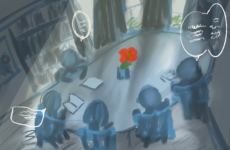To be completely honest, Diversity Day is something that I haven’t really looked forward to in the past few years. I was never really excited for Diversity Day because, while I was happy we were learning to celebrate our differences, I never felt united with other Choate students at the end of the day. This year’s Diversity Day came as a pleasant surprise to me, because for the first time I saw that intellectual diversity was finally being brought to the table.
In such a tumultuous and partisan time in our nation’s history, one can hear the divisive rhetoric spewed by both sides of the political aisle. I found myself in an increasingly strange place as the political season moved forward because of my own conservative political views. It was a bizarre feeling at times, and a dangerous one at others. About a month before the elections happened, I had a few encounters with people from my hometown. Some of these people were old friends and others were acquaintances. I immediately became upset when they began to shout hateful things at me that should never be said to another person. The most insulting of these comments was “traitor to your race,” as if I don’t love the community who raised me just as much as they do.
I usually don’t take these attacks personally and don’t let them upset me. I find inspiration in other people who I know have felt this hateful rhetoric in the past. One person who has faced this kind of terror is Thomas Sowell, an African-American conservative economist who has published numerous acclaimed works in his professional field. He presents a different opinion on race relations and welfare economics than “mainstream” liberal voices and has given unique perspectives and remedies for various social issues. I don’t necessarily agree with him on everything, but I admire him for providing his perspectives that break the traditional orthodoxy of opinions expected of the members of both the African-American and Hispanic communities.
This rejection of freedom of thought within minority communities isn’t limited to just political pundits and economists, but has infiltrated Hollywood as well. Zoe Saldana, an American of Dominican and Puerto Rican decent, also stated her perspective on the peaceful transfer of power to President Donald Trump. In an interview with Jorge Ramos of Univision, she stated, “I have faith in [Donald Trump] because he is the president of my nation, and I was not raised to have preference to a person, but to be an American.” A supporter of Hillary Clinton and a fan of Barack Obama, Saldana took the liberty of trying to provide a voice of reason and of bipartisanship in such a divisive time, but many in the online community felt otherwise. Some criticisms were very reasonable, but others were extremely misplaced and rude. I found it funny and sad to watch the crowd rush to distance itself from a person brave enough to out of the norm.
With all of these things in mind, I was pleasantly surprised that the Diversity Day planners made sure that intellectual diversity was present by giving students the freedom to give their own opinions in various workshops and classroom discussions, rather than simply holding another school meeting in which the administration only offered one point of view. This year, perhaps because of the emphasis that the School put on having those with differing viewpoints speak up, I heard a lot more diversity of opinion than in past years. With luck, this will continue. Giving individuals the power to express their personal views freely and respectfully will create an environment in which we can actually have the conversations that matter. The end result will be diversity that creates trust and most importantly, unity.





